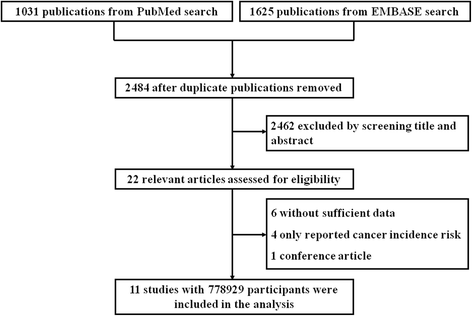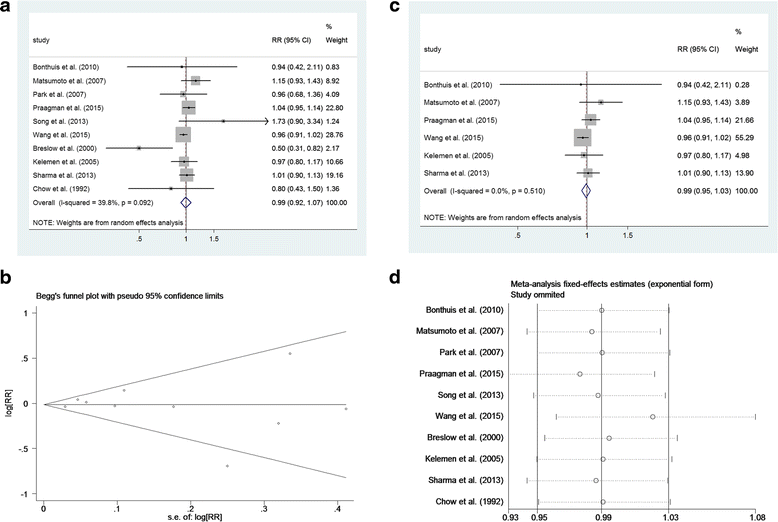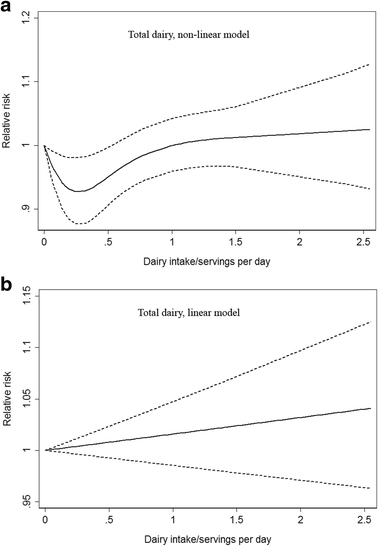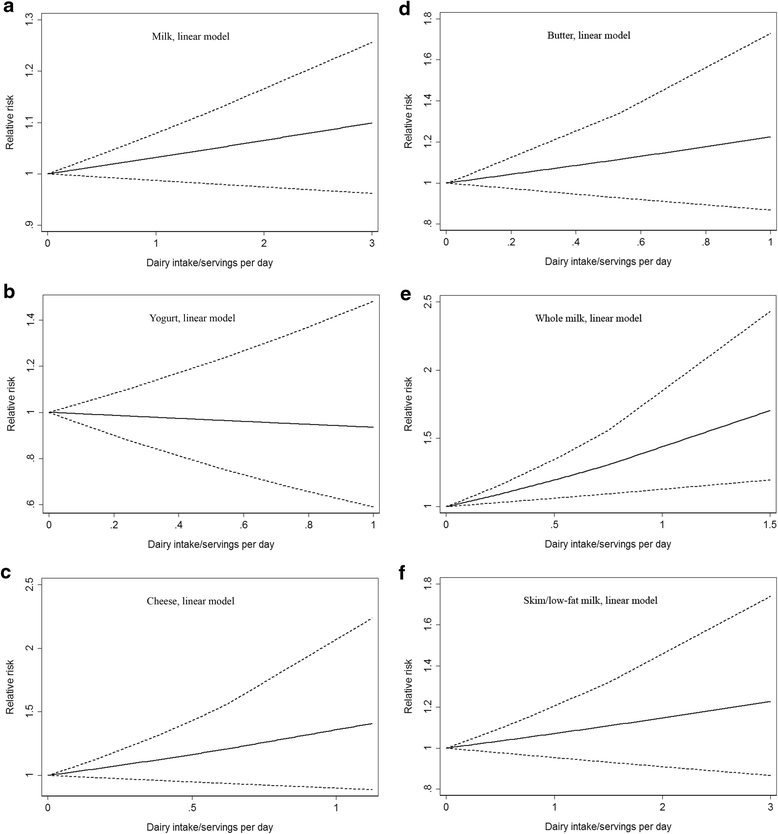Dairy products intake and cancer mortality risk: a meta-analysis of 11 population-based cohort studies
- PMID: 27765039
- PMCID: PMC5073921
- DOI: 10.1186/s12937-016-0210-9
Dairy products intake and cancer mortality risk: a meta-analysis of 11 population-based cohort studies
Abstract
Background: Dairy products are major components of daily diet and the association between consumption of dairy products and public health issues has captured great attention. In this study, we conducted a meta-analysis to investigate the association between dairy products intake and cancer mortality risk.
Methods: After a literature search in PubMed and EMBASE, 11 population-based cohort studies involving 778,929 individuals were considered eligible and included in the analyses. Data were extracted and the association between dairy products intake and cancer mortality risk was estimated by calculating pooled relative risks (RRs) and corresponding 95 % confidence intervals (CIs). Sensitivity analyses and subgroup analyses based on regions, genders and dairy types were performed as well. Potential dose-response relationship was further explored by adopting the generalized least squares (GLST) method.
Results: Total dairy products intake was not associated with all cancer mortality risk, with the pooled RR of 0.99 (95 % CI 0.92-1.07, p = 0.893). Subgroup analyses showed that the pooled RRs were 0.97 (95 % CI 0.92-1.03, p = 0.314) for milk, 0.88 (95 % CI 0.71-1.10, p = 0.271) for yogurt, 1.23 (95 % CI 0.94-1.61, p = 0.127) for cheese and 1.13 (95 % CI 0.89-1.44, p = 0.317) for butter in male and female, however the pooled RR was 1.50 (95 % CI 1.03-2.17, p = 0.032) for whole milk in male, which was limited to prostate cancer. Further dose-response analyses were performed and we found that increase of whole milk (serving/day) induced elevated prostate cancer mortality risk significantly, with the RR of 1.43 (95 % CI 1.13-1.81, p = 0.003).
Conclusions: Total dairy products intake have no significant impact on increased all cancer mortality risk, while low total dairy intake even reduced relative risk based on the non-linear model. However, whole milk intake in men contributed to elevated prostate cancer mortality risk significantly. Furthermore, a linear dose-response relationship existed between increase of whole milk intake and increase of prostate cancer mortality risk.
Keywords: Cancer; Dairy products; Dose–response; Meta-analysis; Mortality risk.
Figures




Similar articles
-
Dairy Product Consumption and Risk of Non-Hodgkin Lymphoma: A Meta-Analysis.Nutrients. 2016 Feb 27;8(3):120. doi: 10.3390/nu8030120. Nutrients. 2016. PMID: 26927171 Free PMC article. Review.
-
The association between dairy products consumption and prostate cancer risk: a systematic review and meta-analysis.Br J Nutr. 2023 May 28;129(10):1714-1731. doi: 10.1017/S0007114522002380. Epub 2022 Aug 10. Br J Nutr. 2023. PMID: 35945656 Review.
-
Dairy products, dietary calcium and vitamin D intake as risk factors for prostate cancer: a meta-analysis of 26,769 cases from 45 observational studies.Nutr Cancer. 2008;60(4):421-41. doi: 10.1080/01635580801911779. Nutr Cancer. 2008. PMID: 18584476
-
Dairy consumption and incidence of hypertension: a dose-response meta-analysis of prospective cohort studies.Hypertension. 2012 Nov;60(5):1131-7. doi: 10.1161/HYPERTENSIONAHA.112.195206. Epub 2012 Sep 17. Hypertension. 2012. PMID: 22987924
-
Prospective studies of dairy product and calcium intakes and prostate cancer risk: a meta-analysis.J Natl Cancer Inst. 2005 Dec 7;97(23):1768-77. doi: 10.1093/jnci/dji402. J Natl Cancer Inst. 2005. PMID: 16333032
Cited by
-
Stages of Change in Dairy Intake among Older Adults: Application of the Transtheoretical Model.Int J Environ Res Public Health. 2022 Jan 20;19(3):1146. doi: 10.3390/ijerph19031146. Int J Environ Res Public Health. 2022. PMID: 35162169 Free PMC article.
-
Milk's Role as an Epigenetic Regulator in Health and Disease.Diseases. 2017 Mar 15;5(1):12. doi: 10.3390/diseases5010012. Diseases. 2017. PMID: 28933365 Free PMC article. Review.
-
Dairy Consumption and Total Cancer and Cancer-Specific Mortality: A Meta-Analysis of Prospective Cohort Studies.Adv Nutr. 2022 Aug 1;13(4):1063-1082. doi: 10.1093/advances/nmab135. Adv Nutr. 2022. PMID: 34788365 Free PMC article.
-
Major dietary patterns and dietary inflammatory index in relation to dyslipidemia using cross-sectional results from the RaNCD cohort study.Sci Rep. 2023 Nov 4;13(1):19075. doi: 10.1038/s41598-023-46447-8. Sci Rep. 2023. PMID: 37925569 Free PMC article.
-
Dietary factors and their influence on immunotherapy strategies in oncology: a comprehensive review.Cell Death Dis. 2024 Apr 9;15(4):254. doi: 10.1038/s41419-024-06641-6. Cell Death Dis. 2024. PMID: 38594256 Free PMC article. Review.
References
Publication types
MeSH terms
LinkOut - more resources
Full Text Sources
Other Literature Sources

